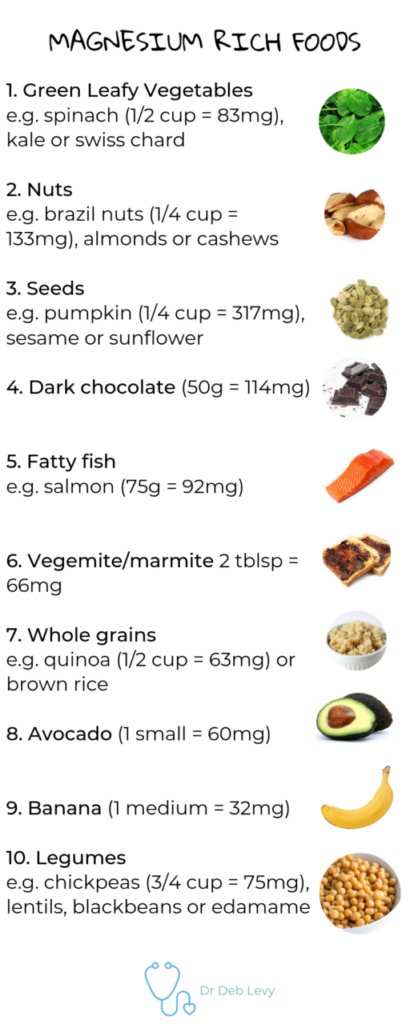Did you know that magnesium is one of the most important minerals in our body? It’s needed for over 300 biochemical reactions and is intricately involved in most body systems. Muscle cramps, irregular heart beats, high blood pressure, anxiety and insomnia are just a few of the conditions that have been linked to low magnesium levels.
Unfortunately, many of our children are deficient. The Australian Bureau of Statistics reports 61% of teenage boys and 72% of teenage girls don’t consume enough. Magnesium is an essential mineral, this means we absolutely need to eat it as our bodies can’t make it.
What are the benefits of magnesium in our diet?
Healthy bones and teeth. Magnesium is vital for calcium absorption, vitamin D activation and making healthy bones. So children who are growing have a high demand for all these nutrients.
Healthy muscles. You know that annoying eye twitch you sometimes get? Or when your child has leg cramps or ‘growing pains’? How about constipation? Well all of these conditions could be from magnesium deficiency. Magnesium helps muscles work properly. This includes skeletal muscles, the heart and even the muscles in your child’s gut, lungs and blood vessels. Without magnesium our muscles would not be able to relax properly and would be contracted all the time.
Healthy nervous system and mood. Magnesium acts as a relaxant and can help improve depression, anxiety, irritability, poor attention and bad sleep. Sadly, these are all conditions that I am seeing more frequently in my practice. Some studies have also linked low magnesium to ADHD. Magnesium increases the relaxation neurotransmitter called GABA, promotes serotonin production and helps control our cortisol stress response. It may even directly alter our gut microbiome. The gut-brain relationship is an emerging area of research and it’s fascinating!
Energy production. As well as relaxation, magnesium helps create energy in cells that is needed for cells to work properly. It’s also needed to make proteins (including our DNA) and for cells to repair themselves.
Regulation of blood sugar levels. Magnesium is essential to help our children to cope with those birthday party sugar overloads! It ensures insulin works properly and keeps sugar levels stable. There are even some studies showing that magnesium protects against developing type 2 diabetes.
Used to manage life threatening conditions. As an emergency doctor I have used high doses of magnesium intravenously to treat seizures, severe asthma or even heart arrhythmias to name a few conditions. Some mums reading this may have even been prescribed it for preeclampsia. So this essential nutrient truly has life saving capabilities!
Okay, so now that I’ve explained why it’s so important lets see how much you should aim for and what are the best foods to eat.

| Age | Recommended daily intake |
| 0-6 months | 30mg/day |
| 7-12 months | 75mg/day |
| 1-3 years | 80mg/day |
| 4-8 years | 130mg/day |
| 9-13 years | 240mg/day |
| 14- 18 years | 360mg/day GIRLS |
| 14-18 years | 410mg/day BOYS |
Please do not self prescribe magnesium supplements to your children without first seeing your healthcare provider. As with low levels, high levels can also cause problems.


